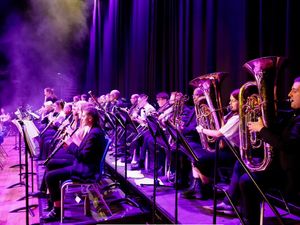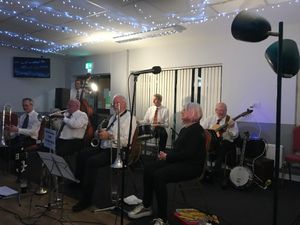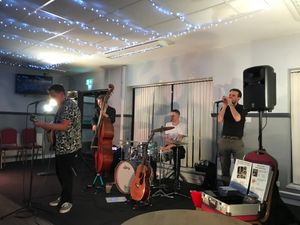Mystery Jets frontman Blaine Harrison discusses their long-awaited sixth album
Four years after Curve Of The Earth signalled their evolution from wistful indie band to rebel songwriters, Mystery Jets are back with an album of overtly political pop, and frontman Blaine Harrison has much to say about the climate strikes, coronavirus and grime music.

Fate has done its best to derail Mystery Jets and their frontman Blaine Harrison.
First, the release of their sixth album, A Billion Heartbeats, and its September support tour were delayed after Harrison underwent emergency surgery.
Now, coronavirus has forced them to postpone their live dates a second time, until autumn this year.
The band, however, were determined to release their album.
“It would have been wrong to delay the music again,” explains Harrison down the line from his studio in central London.
“These songs need to be out there in the world doing their thing.
“Although life is different at the moment, community feels more important than ever – togetherness feels more important than ever.
“That’s what A Billion Heartbeats is about. It’s about empathising with other people and sharing our experiences in difficult times.”
A decade ago, Mystery Jets were a very different beast.
Formed in 2003 on Eel Pie Island, a Twickenham mudflat home to a huddle of hippy communes, the band was swept up in the Noughties folk explosion.
Twee tracks like Two Doors Down and Young Love with Laura Marling helped define that era, alongside acts like Johnny Flynn (now a bona fide film star) and Dry The River.
They were also notable for the fact that Harrison’s father Henry featured as bassist, albeit briefly.
When the indie bubble burst at the end of the decade and bands like The Libertines lost their cultural cache, Mystery Jets looked to America.
Their varied and eccentric haircuts have charted this transformation from folkies to radical songwriters in the vein of Woody Guthrie or Billy Bragg.
More recently, the band performed at the Extinction Rebellion protests and the march celebrating the NHS’s 70th anniversary.
This period also saw Harrison, who has spina bifida, include his crutches in their press photos for the first time.
“They are part of who I am,” he says matter-of-factly.
A Billion Heartbeats - a name taken from Yuval Noah Harari’s zeitgeist-capturing Sapiens book - was born out of those moments.
“A protest is a billion hearts beating together towards a common goal,” he relates.
“That’s what a music festival is as well. You go to a festival to escape or rejoice or lose your mind.
“Whatever draws you there, it’s that feeling of being in a sheer mass of people pulled by the same force.
“I have always thought of a protest as being like a festival of resistance.”
The album takes in vast swathes of culture – Trump, Brexit, the climate crisis, women’s rights, race relations, the plight of the NHS.
It would feel messy if not for its execution.
Of all these topics, there is one that Harrison holds dearest.
The singer and multi-instrumentalist has spent much of his 34 years in NHS hospitals being treated for spina bifida, a condition that develops during pregnancy when the bones of the baby’s spine do not form properly.
He is a patron of Attitude Is Everything, which works with venues to make gigs more accessible, and last year Mystery Jets performed a free lunchtime concert for NHS workers at London’s St Thomas’ Hospital. Hospital Radio, which features on the album, was inspired by the hundreds of hospital radio stations in operation around the UK.
“That was our first protest song,” he recalls. “Writing it shaped all the songs that came after it on the record.
“It stemmed from a very personal feeling. When I wrote it I didn’t quite appreciate how many people felt that way about the NHS.
“I have often said the NHS is the closest thing the British have to a religion, and that has never felt more true than right now.”
“When everyone took to the streets and shared an applause, the participation across the country crossed so many divides.”
Harrison lives in London’s Holborn, and before that he lived on The Strand - but back in 2017, after a decade of living in flat shares across the capital, he thought it might be time to “check out and live somewhere else”.
The city felt like the Ourobouros, he says, the ancient snake who eats its own tail, perpetuating an unstoppable cycle of rebirth and destruction.
But then the opportunity arose for him to become a property guardian for an abandoned office on The Strand, with a direct view of Trafalgar Square.
The agreement offered him space to build a studio and a clear view of the protests taking place below Nelson’s Column. Soon he and his band were in the midst.
“I arrived in zone one in the wake of the referendum and just after Trump entered office,” he explains.
“There was quite a spike in race-related crimes in London and the UK, and suddenly casual racism started showing its face in more and more places.
“It wasn’t just in Britain. The alt-right is now the second largest party in Germany.
“I started attending protests. It was a way for me to get closer to, I suppose, the truth.”
Recently, he moved to his current home, a second guardianship in Holborn.
His band’s decision to go political, it seems, was also born out of a frustration with what rock and roll had become.
“Guitar music has become very polite and sanitised,” he declares.
“It doesn’t have to be like that. It’s why grime is the punk of today...
“...which is the most white person thing that has ever been said,” he laughs.
“But it really is. Grime is talking about the mechanics of society in way that guitar music has done at points in time.”
Harrison is philosophical about the fact his band’s tour has been postponed once again.
He suggests the virus is nature “sending us to our bedrooms to think about what we have done”.
In fact, he sees positivity in the lockdown.
“When we are going about our everyday lives, perhaps we have got the blinkers on and we are so focused on getting our head down, working and keeping the wolf from the door that we forget the importance of human contact.
“That’s what this moment is teaching us.” A Billion Heartbeats is out now. Mystery Jets embark on their postponed UK tour in the autumn.





